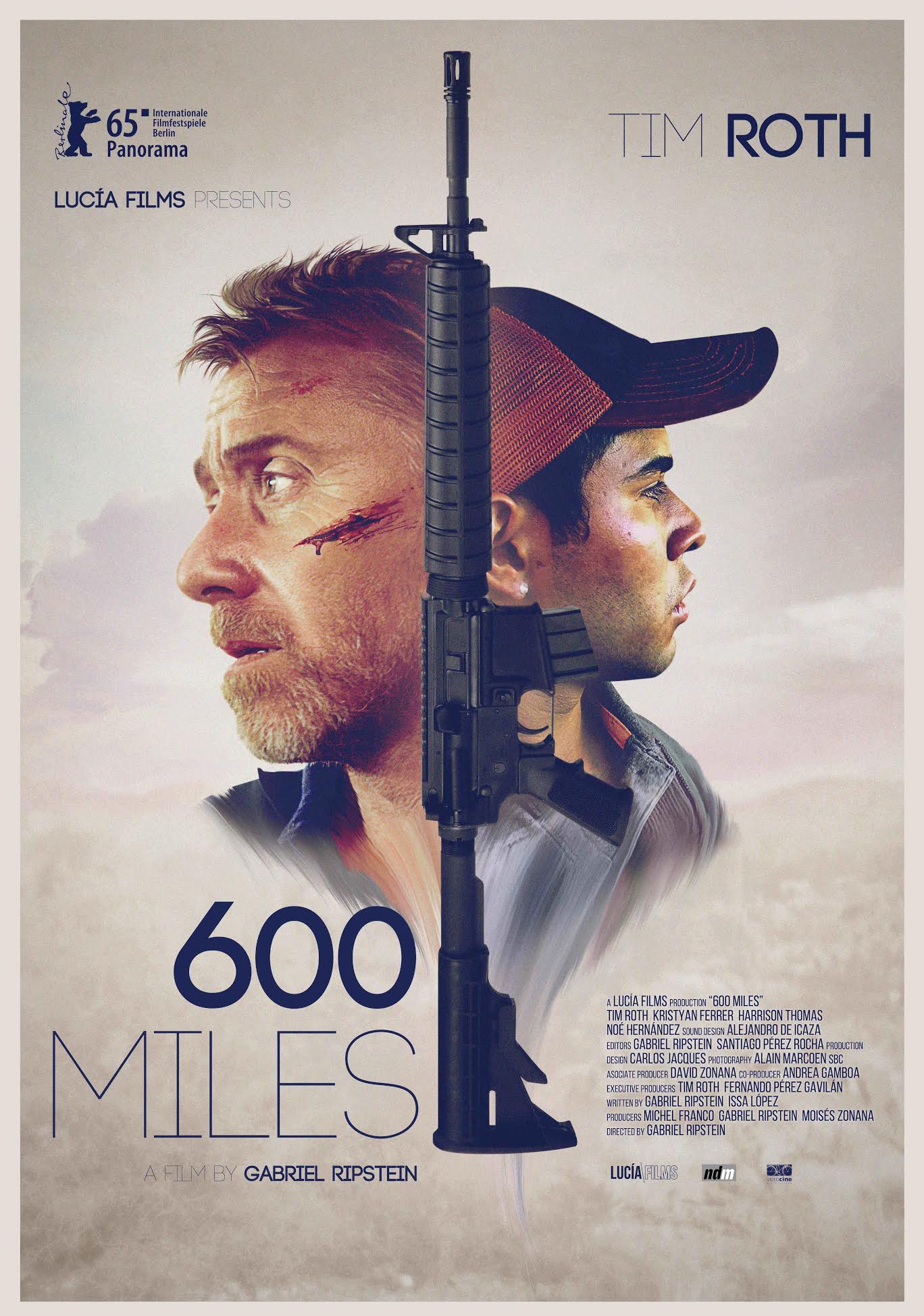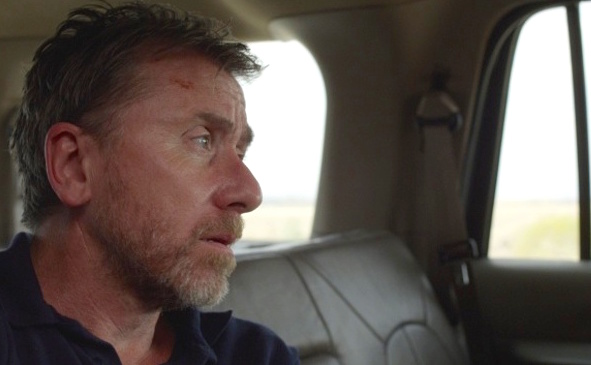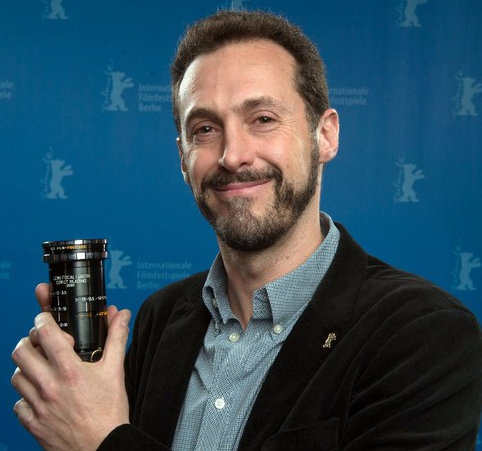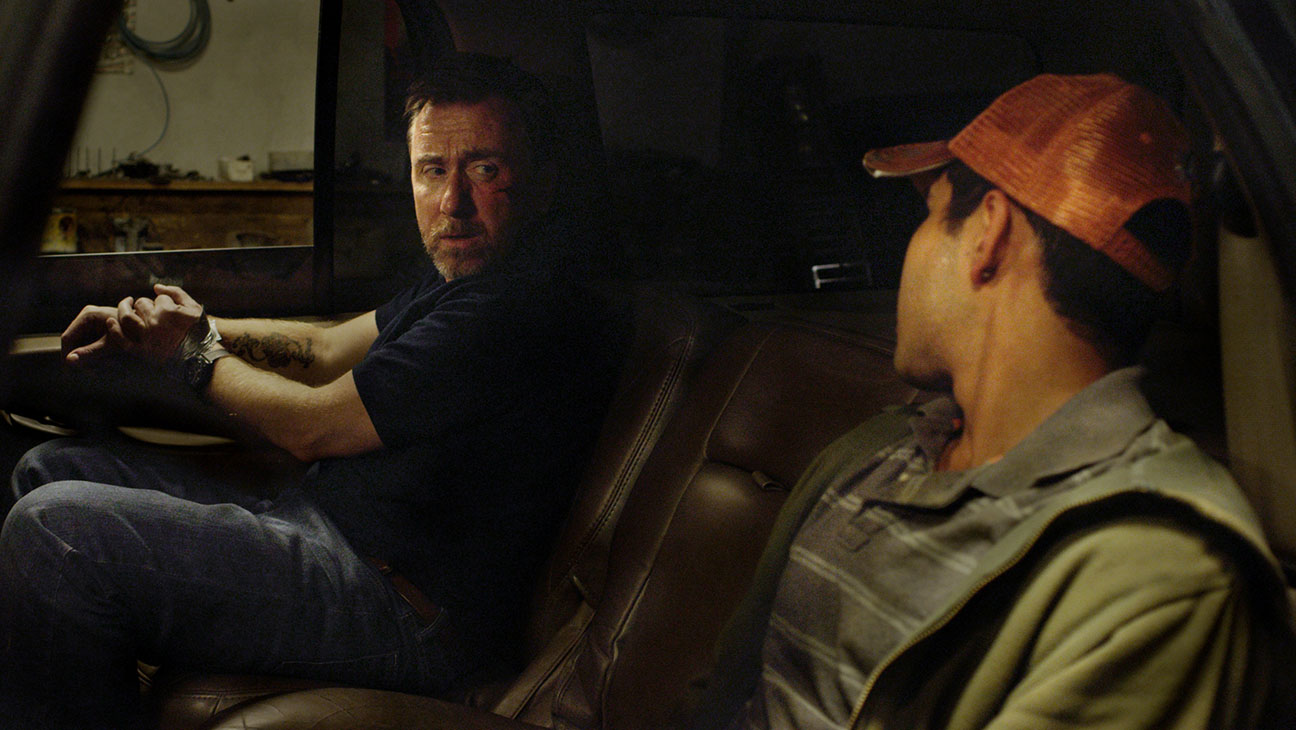Interview: Director Gabriel Ripstein on Mexican Oscar Submission '600 Miles', and Working with Tim Roth
 Tuesday, December 8, 2015 at 8:46AM
Tuesday, December 8, 2015 at 8:46AM
 Jose here. I spoke to 600 Miles director Gabriel Ripstein minutes after an earthquake hit Mexico City on November 23rd and unexpectedly became the bearer of bad news when I asked him if his family was alright. Mr. Ripstein wasn’t aware there’d been an earthquake, but calmly added “no news is good news”. His serene demeanor reminded me of the tone of his film, a weapon-trafficking tale which could’ve easily become a sensationalist drama, but instead goes for an understated, thoughtful approach. The film stars Tim Roth as an American ATF agent who is kidnapped by a Mexican weapons smuggler played by Kristyan Ferrer (who audiences will know from Sin Nombre).
Jose here. I spoke to 600 Miles director Gabriel Ripstein minutes after an earthquake hit Mexico City on November 23rd and unexpectedly became the bearer of bad news when I asked him if his family was alright. Mr. Ripstein wasn’t aware there’d been an earthquake, but calmly added “no news is good news”. His serene demeanor reminded me of the tone of his film, a weapon-trafficking tale which could’ve easily become a sensationalist drama, but instead goes for an understated, thoughtful approach. The film stars Tim Roth as an American ATF agent who is kidnapped by a Mexican weapons smuggler played by Kristyan Ferrer (who audiences will know from Sin Nombre).
Ripstein allows his actors to revel in the humanity of these characters and delivers a film that goes beyond “odd couple” clichés, to comment on an issue that doesn’t get as much coverage as the war on drugs or terrorism. Because of its confident pacing and bold mise-en-scene, one wouldn’t guess from watching the film, that it also happens to be Ripstein’s directorial debut (it won the award for Best First Feature at the Berlinale), and yet, the first time filmmaker impressed members of the Mexican Film Academy so much that they submitted his film as their Oscar entry. I spoke to Ripstein about working with Roth, the incredible cinematic legacy of his family, and what an Oscar nomination might mean for his career.
Read the interview after the jump...

JOSE: This is your first feature film, but you’ve lived your whole life in the industry. You said once that you were born in a film set. Your grandfather and father are some of the most respected cinematic figures in Mexican history. What made you decide to finally direct?
GABRIEL RIPSTEIN: It was a long road! Like you mentioned, I was born in the industry, but when I was a teenager I decided to be a rebel by choosing to do something “serious” with my life. I wanted to work in something that would give me money so I became an economist, then I became a business consultant. I wore a suit and tie, and did extremely boring things that made me miserable. One day I decided to quit and return to filmmaking. I started on the business side by becoming a producer, like my grandfather, I did that during many years and then started working on the creative side. I worked in a Hollywood studio, did independent cinema in Mexico, I started writing screenplays, sold some of them and was able to make a living with this. As I became more comfortable I decided it was time to direct. I never directed a short film or a music video before, but I was lucky enough to be surrounded by people who believed in the film.
JOSE: The work of your grandfather and father pretty much sums up the history of Mexican cinema. The former, nurtured great filmmakers during the Golden Era of Mexican cinema, and your father helped Mexican cinema go beyond national borders. Did you feel pressured to maintain the good family name with your film? Gabriel Ripstein at the 2015 BerlinaleGABRIEL RIPSTEIN: (Laughs) Luckily I never thought of that! Can you imagine the pressure? I decided not to burden myself with unnecessary worries, but I’m also lucky to have my surname because it’s a name that’s associated with cinema. If my grandfather had been a carpenter I might be making tables right now. I’m lucky that my grandfather decided to quit a career in accounting to become a film producer, because making movies is one of the most fun things to do. I think what I take from my grandfather and father is the love of making films. I respect their legacy and when I made my film I tried to keep in mind how lucky I am. I never wanted to either stay away or pay homage to their films though, I just wanted to be able to tell a story in the most honest way possible. I wanted to be serious, but also having fun. Being on a film set is like living in a bubble with creative people who want to play along with you.
Gabriel Ripstein at the 2015 BerlinaleGABRIEL RIPSTEIN: (Laughs) Luckily I never thought of that! Can you imagine the pressure? I decided not to burden myself with unnecessary worries, but I’m also lucky to have my surname because it’s a name that’s associated with cinema. If my grandfather had been a carpenter I might be making tables right now. I’m lucky that my grandfather decided to quit a career in accounting to become a film producer, because making movies is one of the most fun things to do. I think what I take from my grandfather and father is the love of making films. I respect their legacy and when I made my film I tried to keep in mind how lucky I am. I never wanted to either stay away or pay homage to their films though, I just wanted to be able to tell a story in the most honest way possible. I wanted to be serious, but also having fun. Being on a film set is like living in a bubble with creative people who want to play along with you.
JOSE: And what players you have! How was the process of rehearsing with Tim Roth and Kristyan Ferrer?
GABRIEL RIPSTEIN: We didn’t have rehearsals actually, the film aims to be very naturalistic, so all we did was have conversations about the cadence we needed in each scene. Tim and Kristyan are very intelligent actors who knew what we needed in terms of tone, they knew how to modulate their work, my job was to calibrate them. They were incredibly generous to each other, and both are great actors. Tim hasn’t only worked with some of the world’s best directors, but he’s also a director himself, so his questions and observations force you to be at the top of your game. He responds very well to intelligent provocation and Kristyan was a great match for him, he wasn’t intimidated by him, which sparked even more interest in Tim. The fact that they trusted a first time director was a truly courageous act, and I’m glad we achieved a level of complicity you aspire to have with the people you work with.
Most films about arms trafficking, or drug trafficking tend to sensationalize the subject matter and rely on action movie conventions, however in 600 Miles we get something completely different, and it’s that we see how “sudden” and “dull” violence actually is. It made me quite uncomfortable at times to be honest.
Well that’s what we were aiming for, I was trying to stay away from making a film that would glamorize or stylize violence. I also think violence is “dull”, but it’s also dirty and unpleasant, and that’s what I wanted to show. In traditional films where we see people shooting each other, by the 100th shot, audience members are completely numb, they don’t care anymore, so there is no dramatic weight in any of the bullets. I wanted to make a film in which we talked more about weapons without shooting as much. I didn’t want to follow the codes of thrillers which never surprise people anymore. Violence is very disgusting, when I was young I saw a man who died from a bullet wound. It was terrible! The amount of blood pouring out of him was terrifying! It’s not like the movies at all. I’m not necessarily against movie violence, I love Tarantino’s films for instance, but the tone for my film needed to be more like a quasi-documentary.
Is this quasi-documentary quality the reason why you chose Alain Marcoen as your DP? Did you become interested in working with him based on his work with the Dardenne brothers?
Absolutely. I am a huge fan of the Dardenne brothers, and I wanted my film to look like theirs, so I went to LinkedIN, found Alain, sent him a message and told him I wanted him to be the DP in my film. To my surprise he replied and agreed to work with me. His eye was just what the film required.

This is also an important film in terms of what’s going on with the Republican Party and their anti-immigration campaign. While your film addresses the importance of developing friendly relations between the US and Mexico, it also does it in a great apolitical way. How were you able to make a film that doesn’t feel didactic in any way?
Those were the strict rules I adhered to: no clichés, no simplification, not pointing fingers or say who’s good and bad. Weapons trafficking is much too complex for that, you can’t say the problem is just America’s weapon obsession, because in Mexico we also have organized crime. It’s a co-responsibility. If the film has any political intentions, it’s to establish a dialogue between both countries. Mexico and the US have a very complicated relationship, and in a way the two main characters in my film represent where they come from, we see American pragmatism combined with Mexican “chaos”, but I’m not saying all Americans are cold, or that all Mexicans are messy, I know life is much more “gray” than that.
Two Mexican directors have won back-to-back directing Oscars. Working within the Mexican industry have you seen this have an effect in terms of international projection?
Yes, there’s great admiration and respect for the work of these Mexican filmmakers abroad. I admire the tenacity and vision of Alfonso Cuarón, Alejandro Iñárritu and Guillermo del Toro, in terms of doing very personal films on an international scale. They undoubtedly inspire me because they never betray themselves, they continue exploring their obsessions, painting on a larger canvas than what Mexico allowed them. I’m proud that these men are from my country.
Your father, Arturo, has had his own films submitted for the Oscar on five different occasions, did he have any advice to give you? What would an Oscar nomination mean for your career and for Mexico?
For starters I’m incredibly honored that the Mexican Academy chose my film, because it was voted by my peers. To be nominated for the Oscar would be great because of the visibility it would bring the film. The Foreign Language category in particular is voted by people from all walks of life, that they will get to watch my film means a lot to me. A nomination would be great for my career, because more than an award it would allow me to make more films, which is the one thing I’m interested in.
What will that movie be about? Is it the “god” film you’ve mentioned in interviews?
Yes, I need to sit down and write it. It’s about god and faith.
You’ll need to make a comedy after these two films then.
I certainly would not reject that idea (laughs).

600 Miles will be distributed in the States by Pantelion Films.
 Gabriel Ripstein,
Gabriel Ripstein,  Mexico,
Mexico,  Tim Roth,
Tim Roth,  foreign films,
foreign films,  interview
interview 


Reader Comments